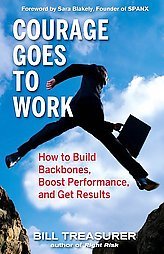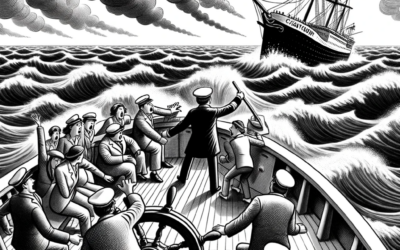 A continuation of the interview with Bill Treasurer. Bill Treasurer is founder and Chief Encouragement Officer at Giant Leap Consulting (GLC), a courage-building company that exists to help people and organizations live more courageously. Bill is also the author of Courage Goes to Work (Berrett-Koehler Publishers, 2008), a book about how to inspire more courageous behavior in workplace settings. He has been cited by 100s of newspapers and magazines and has published many other books. Interestingly he was also on the US High Diving Team making over a 1,500 dives at 150 feet. Now that is courage! I asked Bill to be interviewed because of the connection his work has with Just Ask Leadership. It takes a great deal of courage at times to ask certain questions. How you ask, as Bill points out, is just as important.
A continuation of the interview with Bill Treasurer. Bill Treasurer is founder and Chief Encouragement Officer at Giant Leap Consulting (GLC), a courage-building company that exists to help people and organizations live more courageously. Bill is also the author of Courage Goes to Work (Berrett-Koehler Publishers, 2008), a book about how to inspire more courageous behavior in workplace settings. He has been cited by 100s of newspapers and magazines and has published many other books. Interestingly he was also on the US High Diving Team making over a 1,500 dives at 150 feet. Now that is courage! I asked Bill to be interviewed because of the connection his work has with Just Ask Leadership. It takes a great deal of courage at times to ask certain questions. How you ask, as Bill points out, is just as important.
Gary Cohen: You talk about building courage. How does one do strength building of this mental muscle?
Bill Treasurer: Below are some tips for helping you be more courageous at work:
· Be Mindful of the Risks of Not Risking. The risk of inaction is usually more perilous than the risk of action. As you consider a risk, be sure to be clear about the dangers of not taking the risk too!
· Ask the Holy Question. Here are the four most important words you’ll ever learn in the English language: what do you want? Most people don’t take the time to answer that question with specificity. Those who do, however, are in a much better position to figure out the actions they need to take in order to get what they want!
· Have Something to Prove. Take on challenges that cause you to have to prove yourself to yourself. When the going gets rough, having something to prove can be a source of energy and motivation.
· Make Forward-falling Mistakes. Making no mistakes is just as dangerous as making too many. Have a “mistake ratio” – a good balance between not making enough mistakes and making too many. As long as you’re the mistakes you make are forward-falling, you’re making progress.
· Harness Fear. Fear is a normal, natural, and necessary part of the work experience. While uncomfortable, fear has energy. And that energy can be useful when facing tough challenges. Harness your fear by spending time with it. The more you experience the thing that you’re afraid of, the more desensitized you become to it.
· Jump First. The best way to encourage those around you to be more courageous, is to be more courageous yourself…first! Ask yourself when was the last time you did something courageous that probably left a favorable impression on the people you work with. When did you last Jump First!
Leaders often get to a place of comfort where they are simply playing defense and protecting what they already have. How does your book and ideas help these leaders see the issues of playing defense versus staying on offense – with the skills that brought them to their current position?
I emphasize the importance of considering the dangers of playing it too safe. Safety, when it causes an obsession with protectionism, or worse, immobilization, can be a very dangerous thing. Every risk can be divided into two; the risk of action and the risk of inaction. Too often, “safe” leaders make decisions after accounting for one (the risk of action) and not the other. Smart leaders also ask, “What is the risk of not taking the risk?”
In today’s economy, defense or survival seems to be the operating mode of many businesses. Do you have some ideas that would help leaders of organizations be more successful in these down cycle times?
Workplace productivity and morale are taking a nosedive in the current economy. According to one recent poll, at least three out of four workers say that productivity is down, mistakes are up, and customer service is taking a major hit. Leaders have a big job to do during a down cycle. Here are some tips:
Be steady. As pressures mount in your own work, take a deep breath and try to be a little more cool, calm, and collected yourself. It may be easier said than done, but it’s a fact that people choose to follow level-headed, even-handed leaders.
Be straight. In good times and bad, workers want—and deserve—the truth. Avoid tiptoeing around tough issues and give it to them straight—no spinning or sugarcoating. And to reign in the predictable and pernicious gossip, hold regular “rumor hunts”—ongoing meetings where employees can air the latest rumors and hear the facts directly from you.
Be focused. Right now it’s easy to give in to distractions—taking your eyes off the ball and letting people and projects fall by the wayside. Don’t. Keep people laser-focused on what needs to be done—key priorities for the foreseeable future—and, at least for now, have daily status calls or check-ins.
Be gutsy. Fear can play to your base nature. Commit to rising above it and elevating yourself and your team. Stop talking to employees about what keeps you awake at night, and start talking to them about what gets you up in the morning.
Be hopeful. If there was ever a need for a can-do spirit, it is now. No downplaying the economy or giving false reassurances, but choosing optimism over pessimism, encouragement over discouragement. Start by walking the talk—making it clear, with words and actions, that as difficult as things are right now, the team is better off dealing with what “is” and facing the challenges head-on with hope and determination.
I am wondering in your work with leaders if you see asking questions as a courageous act and if so how?
I am sure that it takes courage to ask leaders some types of questions. That said, I think asking the right questions can provoke courageous behavior. And the questions need to be asked in a way that the leader’s ears can hear. So “how” the question is asked is just as important as what question is asked. If you ask a question because you want to make the leader feel small, or because you want to punish the leader in some way, that spirit will come through and the leader will shut down. Like Oscar Wilde once said, “Whenever there is someone in authority, someone resists authority.” So before asking a hard-hitting question to a leader, check your own motive and intention.
Can you share with me an example when the question that was asked was courageous and what took place because of that question?
I once coached a senior executive who had just gotten demoted because his boss felt that he wasn’t acting bold enough. The senior executive explained, “I don’t get it. I do everything the company and my boss wants me to do. I am a good and loyal soldier!”
I asked, “How might it serve you to stop acting like a good soldier and start behaving like a good leader?”
Then he and I talked about the difference between management and leadership, and between loyal compliance and loyal disobedience. We discussed how being a good soldier had, up until this point, defined his career, but how it had now started to become a drag on his leadership potential. He was playing it too safe, under the excuse of being a good solider. He and I set out a plan for him to behave more boldly and more leader-like. Within a year’s time, he not only got promoted, he got a raise as well. More importantly, he had made an important shift from being a safe manager to a bold leader.



